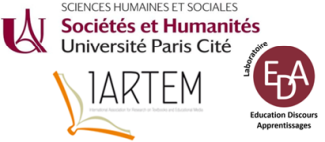This abstract, resulting from my ongoing doctoral research entitled "Technical dimension and skills acquired in digital environments: audiovisual media literacy for critical teacher training", investigates the nuanced exploration of establishing parameters for critical-reflective teacher education in audiovisual and media domain seeking for a literacy in digital environments. The central research that guides this study is structured as follows: 'Can parameters be effectively established for critical-reflective teacher training that not only transmits audiovisual media literacy in digital environments, but also promotes deep understanding and critical engagement with these technological landscapes?' In approaching this research problem, a qualitative approach is used, combining documentary analysis and the Action Research method.
The study unfolds in the educational scenario of public schools in the state of Paraná, Brazil, focusing on teachers of Arts, Human Sciences, Computational Thinking and Literature responsible for the 8th grade of elementary school and/or 1st and 2nd years of high school, that is, students between 12 and 16 years old. These educators become participants in a purposefully designed short-term online course spanning four sessions, where various technology-mediated teaching platforms such as Padlet, Canva, Prezi, Instagram (emphasizing the development of audiovisual materials) and ChatGPT (for a initial exposure to generative artificial intelligence) are actively explored.
The three-pronged analytical process begins with a meticulous description of the data generated from pre- and post-course questionnaires administered to participating teachers. Subsequently, theoretical articulations are intertwined, connecting existing parameters with unexplored needs that emerge from the dynamic interaction between technology, education and critical reflection. This theoretical integration is fundamental to contextualize the results in the broader panorama of educational theory and practice.
The critical interpretation phase of the analysis is inserted into the daily fabric of Brazilian school life, aiming to assist in the emancipation of participants regarding the use of digital technologies in an educational environment. In essence, this phase seeks to uncover how acquired technical proficiency and audiovisual media literacy can be meaningfully integrated into the intricate tapestry of the Brazilian educational system or, further, any educational system in the world.
The theoretical basis of this investigation is based on key concepts such as ubiquitous pedagogy (Santaella, 2013), perspectives on literacy (Soares, 2009), critical reflection on audiovisuals (Ferrés, 2007) and the media literacy in the field of teacher training (Wilson et al., 2013; Grizzle et al., 2016). By incorporating these theoretical frameworks, the investigation aims to create a comprehensive understanding of the intricate interplay between technology, critical pedagogy, and audiovisual literacy in the context of teacher education.
As preliminary results emerge, discernible trends in the data highlight the central role of audiovisual materials as fundamental supports for the transmission of information in the contemporary digital, and educational, landscape. These trends provide valuable insights into the evolving perspectives and actions of participating teachers. Transformative impact is assessed through the lens of pre- and post-course questionnaires, clarifying the extent to which the course influenced participants' perspectives and practices.
Ultimately, this research aims to empower educators, promoting autonomy in teaching and learning mediated by technology. The anticipated paradigm shift encompasses not only the adoption of technical proficiency and audiovisual media literacy, but also extends to broader principles of equity, democracy and technological awareness in diverse educational contexts. In conclusion, this study contributes significantly to the ongoing discourse on effective and inclusive education in an ever-evolving digital landscape, with the potential to help build possible trajectories of teacher education in the digital era.
References
FERRÉS, Joan. La Competencia en Comunicación Audiovisual: dimensiones e indicadores. In: Comunicar: Revista Científica de Comunicación y Educación. Huelva, v. 15, n. 29, p. 100-107, 2007.
GRIZZLE, Alton et al. Alfabetização midiática e informacional: diretrizes para a formulação de políticas e estratégias. Brasília: UNESCO, Cetic.br, 2016.
SANTAELLA, Lúcia. Comunicação ubíqua: repercussões na cultura e na educação. São Paulo: Paulus, 2013.
SOARES, Magda. Letramento: um tema em três gêneros. Belo Horizonte: Autêntica Editora, 2009.
WILSON, Carolyn et al. Alfabetização midiática e informacional: currículo para formação de professores. Brasília: UNESCO; UFTM, 2013.

 PDF version
PDF version
